

Research in Progress. The Anarchitecture Group. Based in New York in the 1970s, Anarchitecture was an artists' group whose members included artists Laurie Anderson, Tina Girouard, Carol Goodden, Suzanne Harris, Jene Highstein, Bernard Kirschenbaun, Richard Landry, and Richard Nonas, as well as the architecturally trained artist, Gordon Matta Clark (1943-1978).
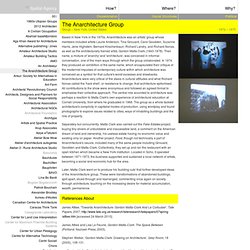
Their name, a mixture of 'anarchy' and 'architecture', was conceived in informal conversation, one of the main ways through which the group collaborated. In 1974 they produced an exhibition of the same name, which encapsulated their critique of the modernist impulses of contemporary culture within which architecture was conceived as a symbol for that culture's worst excesses and drawbacks. Anarchitecture were very critical of the stasis in cultural attitudes and what Richard Nonas called the 'hard shell', or resistance to change, that architecture epitomised. Find A PhD Programme: Brazilian Studies Research, PhD at King’s College London. The Brazil Institute offers supervision for MPhil/PhD research degrees relating to Brazil and draws on academic expertise in a range of disciplinary departments across the College.

Supervision may be provided from within the Institute or jointly with other staff of the College. The following academic staff offer research supervision in the Brazil Institute. Detailed staff profiles can be found on the Brazil Institute website. Professor Anthony Pereira (Director of the King's Brazil Institute): Comparative politics; democracy and authoritarianism; political regimes and regime change; military rule; social movements; citizenship and human rights; new institutions of accountability in Brazilian public security; Brazil's political, economic, and social transformation in the 20th and early 21st century.
Adaptable Suburbs: An historical spatial-ethnography and ‘auto-ethnography’ of suburban commercial practices at University College London. The ‘Adaptable Suburbs’ project is focused on understanding how small centres of socio-economic activity emerge through time, using Greater London as its geographical focus.

It stems from a previous project which looked at twenty of London’s outer suburbs, see www.sstc.ucl.ac.uk. The research will provide evidence for policy decision making and for planning and design to improve the future sustainability of the aging built environment. It will also develop innovative methods for the integration of socio-economic data with information about the layout of urban areas. A common concern of the Adaptable Suburbs project team, reflected in their previous work, is the question of “how the physical city both embodies and shapes the human city”. Based at the Department of Anthropology the student will work with other researchers to produce a rich ‘spatial ethnography’ of selected case study areas in outer-London. Phenomenology. First published Sun Nov 16, 2003; substantive revision Mon Dec 16, 2013.
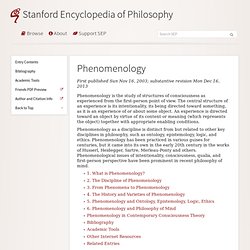
Dependent and independent variables. Variables used in an experiment or modelling can be divided into three types: "dependent variable", "independent variable", or other.
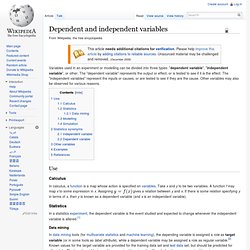
Deductive reasoning. Ugandans hit back at Kony 2012 campaign. Updated Mon 12 Mar 2012, 1:29pm AEDT Ugandans have criticised the viral Kony2012 video, saying it is yet another neo-colonial campaign that portrays Africans as powerless to help themselves.

The 30-minute film was produced by an American advocacy group and aims to raise awareness about wanted war criminal Joseph Kony, the head of the Lord's Resistance Army, and the plight of child soldiers in central Africa. It has been watched and passed on by tens of millions of viewers on YouTube, but has been criticised as simplistic and inaccurate. Kony left a path of destruction and mass murder for more than 20 years, but he is no longer in Uganda and has not been for six years. Writing on his blog, Ugandan journalist Angelo Izama said "to call the campaign a misrepresentation is an understatement". Another Ugandan journalist fighting back via social media is Rosebell Kagumire. Her video argues against what she calls yet another neo-colonial campaign aimed at saving hapless Africans. Central Place Theory - An Overview of Central Place Theory. Central place theory is a spatial theory in urban geography that attempts to explain the reasons behind the distribution patterns, size, and number of cities and towns around the world.
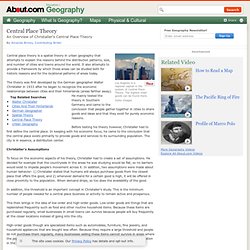
It also attempts to provide a framework by which those areas can be studied both for historic reasons and for the locational patterns of areas today. The theory was first developed by the German geographer Walter Christaller in 1933 after he began to recognize the economic relationships between cities and their hinterlands (areas farther away). He mainly tested the theory in Southern Germany and came to the conclusion that people gather together in cities to share goods and ideas and that they exist for purely economic reasons.
Before testing his theory however, Christaller had to first define the central place. In keeping with his economic focus, he came to the conclusion that the central place exists primarily to provide goods and services to its surrounding population. Graduate School of Design - MicroHome Solutions Slum Redevelopment, New Delhi. MicroHome Solutions Slum Redevelopment, New Delhi Community Service Fellowship Summer 2011 Debashree Pal, MDesS, Sustainable Design '12, worked on a slum redevelopment project with MicroHome Solutions in New Delhi.
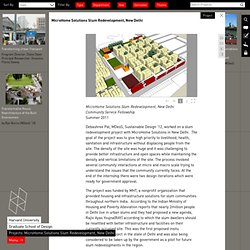
Graduate School of Design - Dirty Work. Dirty Work Landscape in the Non-formal City Partner: John Beardsley, Art Historian, Senior Lecturer, Graduate School of Design 2006-Present There are now approximately one billion people living in squatter communities worldwide, a number expected to double by 2030.
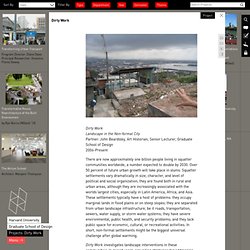
Over 50 percent of future urban growth will take place in slums. Squatter settlements vary dramatically in size, character, and level of political and social organization; they are found both in rural and urban areas, although they are increasingly associated with the worlds largest cities, especially in Latin America, Africa, and Asia. These settlements typically have a host of problems: they occupy marginal lands in flood plains or on steep slopes; they are separated from urban landscape infrastructure, be it roads, transportation, sewers, water supply, or storm water systems; they have severe environmental, public health, and security problems; and they lack public space for economic, cultural, or recreational activities.
Complex adaptive system. They are complex in that they are dynamic networks of interactions, and their relationships are not aggregations of the individual static entities.

They are adaptive in that the individual and collective behavior mutate and self-organize corresponding to the change-initiating micro-event or collection of events.[1][2] Overview[edit] The term complex adaptive systems, or complexity science, is often used to describe the loosely organized academic field that has grown up around the study of such systems. Complexity science is not a single theory— it encompasses more than one theoretical framework and is highly interdisciplinary, seeking the answers to some fundamental questions about living, adaptable, changeable systems. Home.
Journalism. Words. DESIS Network. RUDI - Resource for Urban Design Information. Journals/Competitions. Onsite review - miscellanea. How do I contribute to the informal education homepage? The site is run on a not-for-profit basis. We are part of the British Library archiving project and a number of the pages are included on the UNESCO/NCVER voced database and on SOSIG (the Social Science Information Gateway). If you have something that you want to write or submit, or wish to select something to work on from our wish list, we’d like to hear from you. Its best to contact us before you get a long way into it – there may be someone else also working on a similar subject area. As you will have probably gathered we run the page on a shoestring – so any work has to be done for love. Below we have included our wish list, and set out some guidelines for contributors. Our wishlist We are constantly adding to our list – but these are the pages we’d dearly like to develop at the moment.
Academics.